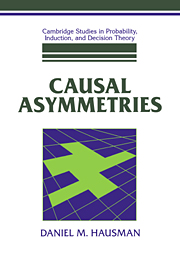Book contents
- Frontmatter
- Contents
- List of Figures
- Acknowledgments
- Introduction: Causation and its Asymmetries
- 1 Metaphysical Pictures and Wishes
- 1* Transfer Theories
- 2 Is Causation a Relation Among Events?
- 3 Causation, Regularities, and Time: Hume's Theory
- 4 Causation and Independence
- 4* Causation, Independence, and Causal Connection
- 5 Agency Theory
- 5* Causal Generalizations and Agency
- 6 The Counterfactual Theory
- 6* Independence and Counterfactual Dependence
- 7 Counterfactuals, Agency, and Independence
- 7* Agency, Counterfactuals, and Independence
- 8 Causation, Explanation, and Laws
- 8* Causation, Explanation, and Independent Alterability
- 9 Probabilistic Causation
- 10 Causation and Conditional Probabilities
- 10* Causal Graphs and Conditional Probabilistic Dependencies
- 11 Intervention, Robustness, and Probabilistic Dependence
- 11* Interventions and Conditional Probabilities
- 12 Operationalizing and Revising the Independence Theory
- 12* Probability Distributions and Causation
- 13 Complications and Conclusions
- Appendix A Alphabetical List of Propositions
- Appendix B List of Theorems
- References
- Index
11 - Intervention, Robustness, and Probabilistic Dependence
Published online by Cambridge University Press: 20 April 2010
- Frontmatter
- Contents
- List of Figures
- Acknowledgments
- Introduction: Causation and its Asymmetries
- 1 Metaphysical Pictures and Wishes
- 1* Transfer Theories
- 2 Is Causation a Relation Among Events?
- 3 Causation, Regularities, and Time: Hume's Theory
- 4 Causation and Independence
- 4* Causation, Independence, and Causal Connection
- 5 Agency Theory
- 5* Causal Generalizations and Agency
- 6 The Counterfactual Theory
- 6* Independence and Counterfactual Dependence
- 7 Counterfactuals, Agency, and Independence
- 7* Agency, Counterfactuals, and Independence
- 8 Causation, Explanation, and Laws
- 8* Causation, Explanation, and Independent Alterability
- 9 Probabilistic Causation
- 10 Causation and Conditional Probabilities
- 10* Causal Graphs and Conditional Probabilistic Dependencies
- 11 Intervention, Robustness, and Probabilistic Dependence
- 11* Interventions and Conditional Probabilities
- 12 Operationalizing and Revising the Independence Theory
- 12* Probability Distributions and Causation
- 13 Complications and Conclusions
- Appendix A Alphabetical List of Propositions
- Appendix B List of Theorems
- References
- Index
Summary
This chapter will be concerned with yet another asymmetry of causation. Recently, several authors have argued that there is an asymmetry of robustness or invariance. In particular, this chapter will consider three related purported asymmetries:
(Asymmetry of robustness) x causes y if and only if the relationship between x and y and other variables is invariant with respect to the value of x but not with respect to the value ofy (Arntzenius 1990, pp. 90–1; Hoover 1990, 1991, 1993; Hoover and Sheffrin 1992; Hoover and Perez 1994).
(Asymmetry of parameter independence) Suppose that S is a complete and correct specification of a causal system involving a set of variables including x and y. x causes y if and only if one can calculate from S the correct value (or the best estimate) of y but not of x, when one substitutes a changed parameter value into S (Simon 1953, p. 69; Hoover 1990, pp. 211–12; Woodward 1995, 1998).
MI (Asymmetry of modal invariance) Suppose that S is a complete and correct specification of a causal system involving a set of variables including x and y. x causes y if and only if the value of y one calculates when one substitutes a new value of JC into S is a correct prediction or a best estimate of what the value of y would be if the value of x were set to its new value via intervention (Cartwright 1989, ch. 4; Hoover 1991, 1994; Woodward 1995, 1998; Forster 1996b).
The phrase “the relationship between x and y” is intentionally vague, because different theorists have focused on different relationships.
- Type
- Chapter
- Information
- Causal Asymmetries , pp. 222 - 232Publisher: Cambridge University PressPrint publication year: 1998



